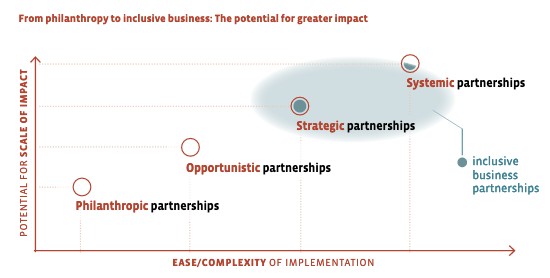Achieving the Sustainable Development Goals (SDGs) builds a lot on engaging the private sector. But how to move from philanthropy-driven collaboration, which is an add-on for a company, to strategic and equal partnerships? How to make such partnerships really effective and realize social impact with a business case? Together with pioneering NGOs and Partos/The Spindle, Endeva developed a guide on NGO and company partnerships for inclusive business.
Challenges for NGO partnering with companies
Why this guide? The reason is that the synergy that combines the best of both worlds – between the civic and private spaces, between ‘development and business’ – does not come automatically.

The interest in partnerships that are more strategic or even systemic in nature (see graph above), is immense. “A clear trend”, says Katja Freiwald, Director of Global Partnerships of Unilever, is “co-created partnerships based on complementary assets and skills. True value-added is one of our guiding principles when selecting NGOs for our inclusive business partnerships”.
However, both NGOs and companies alike struggle with the how. “Often, NGOs feel very weak in a partnership with large corporations”, says Gitte Dyrhagen Husager, Head of Private Sector Engagement, DanChurchAid. And Alexandra Burroughs, CEO of the social enterprise Live Well, which emerged from a partnership between CARE, GlaxoSmithKline and Barclays, stresses that “it is challenging for an NGO to step out of its traditional mindset and adopt a business approach”.
NGOs do have valid questions like: ‘What would our target group and my NGO gain from partnering with a company?’ ‘Are we not compromising our rights-based focus when we adopt a market-based approach?’ They may also face dilemmas, such as: ‘Should we be a paid service provider and receive funding or an equal partner with a company and invest as well?’ Or, they may find it hard to make the case for inclusion – the way they understand it – among their business partners.
These challenges have two root causes: The two objectives underlying inclusive business partnerships, combining social impact with a business case, are not easy to combine. Partly because NGOs and companies are, in fact, very different from one another. Often NGOs and businesses speak a different language and operate under different performance indicators and timeframes. Making a well-balanced collaboration work requires that all participants understand and respect each another’s motivation, organizational culture, and structure – and find ways to nurture the value of their differences. They need to effectively manage the risks involved, rather than have them stand in the way.
Five key building blocks of inclusive business partnerships
Based on a peer learning event with 10 international NGOs, Endeva, a Berlin-based international thought leader and ecosystem facilitator in inclusive business, took the initiative to develop a guide on this topic. They partnered with Partos/The Spindle and others, collected partnership examples from pioneering NGOs and their company partners, and interviewed academic experts to complement extensive research.
The guide is built around five chapters that represent and show the key building blocks of inclusive business partnerships. In addition it offers deep-dives into four specific cases, an overview of practical tools (from self-assessments to partnership MoUs) and documents for further reading. Here I present insights from the chapters.

- When to choose an inclusive business partnerships: Inclusive business partnerships have great potential to combine social impact with a business case. Yet, because of this duality, they are not suitable in every context or for every organization. Because of the wide variety of inclusive business partnerships, in scope (see figure above) and form, parties should explore what suits them best.
- Finding the right partner: Who should an NGO choose as a partner? Which companies should they rule out? NGOs tend to look for perfect partners, but in fact there are just good matches. It all starts with knowing yourself as an organization – what you can really offer and what you need – in order to find a partner that is complementary and fits your values. Building a trust-based relationship with a company requires moving out of your comfort zone and respecting other realities and values.
- Creating opportunities and managing risks: To realize the full potential of inclusive business partnerships, partners need to successfully build on each other’s strengths and be aligned. It is important they do not jump into implementing ‘yet another project’ and remain critical about whether or not they can play all the roles required. The guide also breaks through the myth that either the NGO or the company has easy money at its disposal. NGOs are called upon to use innovative methods to ensure that social impact and the related key performance indicators (KPIs) are an integral part of the business model.
- Changing internally: What are the implications of partnering for inclusive business for your own organization? Inclusive business partnerships diverge from ‘business as usual’ – from managing your development projects or from doing regular business. Hence, both NGOs and companies have to deal with internal critics, develop other competencies and performance criteria, and adapt existing structures. The NGO’s ‘theory of change’, for example, has to incorporate market-based approaches and private sector actors. In short, going for inclusive business partnerships has organizational implications and both partners need to be willing to change internally.
- Moving on or scaling up: Successful partnerships can increase their impact through replication or scaling up. Ideally, the NGO partner moves out after a couple of years, the partnership ends, and the inclusive business model sustains itself. Depending on the scope of the partnership, this can be a long-term process, although there are hard realities on both sides.
Guide relevant for different stakeholders
The guide primarily offers practical guidance to NGOs, but is also relevant to companies. Firstly, because it helps them understand their NGO partner better and, secondly, because if can offer inspiration for the inclusive business agenda of their own company. Interestingly, companies and NGOs often have similar questions and challenges, especially those that refer to internal processes. Their issues and realities tend to mirror each other.
For other key stakeholders such as donors, the guide offers insights into the dilemmas and challenges that NGOs – and for that matter, companies – face, e.g. related to the promise of inclusiveness, NGO-company relations and funding. Despite their immense potential, inclusive business partnerships are not the new ‘one-size-fits-all’ solution to achieve the SDGs; other approaches remain essential. They are also a practice that cannot emerge without internal changes in and investments by NGOs. NGOs would, thus, also benefit from adequate support to realize the promise of inclusive business partnerships.
This blogpost was authored by Nelleke van der Vleuten, associated expert at Endeva. She is a co-author of the report.

